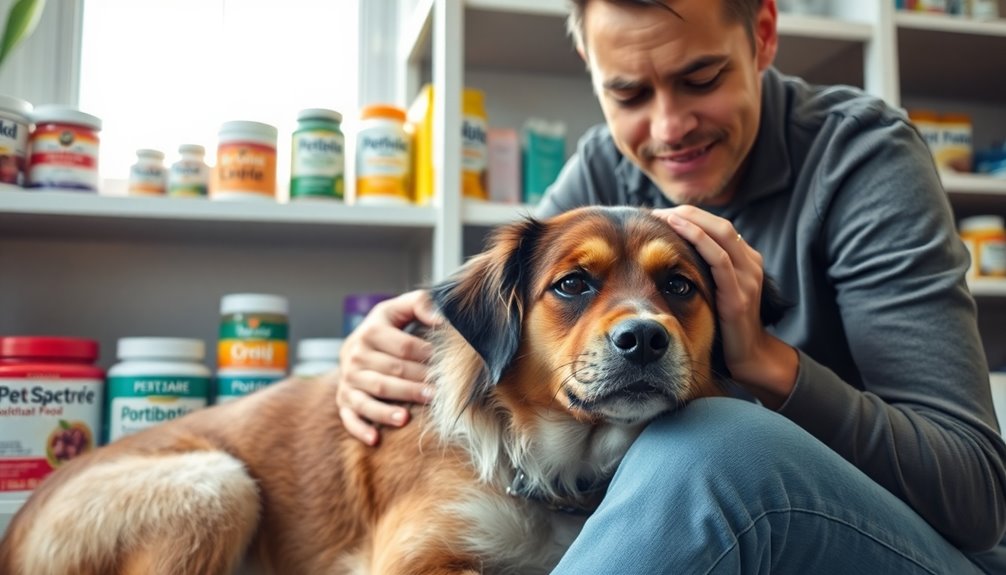Your dog's diarrhea can be caused by several factors, such as eating spoiled food, sudden diet changes, or infections. It might also be a sign of more serious health issues like inflammatory bowel disease. Start by giving your dog a short fasting period, then introduce a bland diet to soothe their stomach. Monitor for signs like blood in the stool or vomiting, which require immediate vet attention. If the diarrhea persists, a veterinarian can help identify the underlying issue and recommend a tailored treatment plan. Keep going to find out more about symptoms and solutions.
Key Takeaways
- Diarrhea in dogs often results from dietary indiscretion, such as eating spoiled food or table scraps.
- Sudden dietary changes can upset a dog's digestive system, leading to diarrhea.
- Infections (viral, bacterial, parasitic) may trigger diarrhea and could require veterinary care.
- Persistent diarrhea, especially with symptoms like vomiting or blood, necessitates immediate veterinary attention.
- Management includes fasting, a bland diet, and probiotics, but ongoing issues need a vet's diagnosis.
Overview of Diarrhea in Dogs

Diarrhea in dogs is a frequent concern for pet owners, often stemming from minor gastrointestinal issues like dietary changes or accidental ingestion of unsuitable foods.
Many dogs will experience diarrhea at least once in their lifetime, making it essential to monitor their health closely. Symptoms can include vomiting and lethargy, which may indicate a more serious underlying cause that requires immediate attention from a vet.
Treatment for diarrhea varies depending on the root cause, and it may involve dietary changes, fasting, or more intensive veterinary intervention.
Always keep an eye on your dog's condition, and if diarrhea persists or worsens, don't hesitate to seek professional help. Your vigilance can make all the difference in ensuring your dog's well-being.
Common Causes of Diarrhea

When your dog experiences diarrhea, it's often due to a variety of common causes that can be easily overlooked.
Dietary indiscretion, like munching on table scraps or spoiled food, frequently leads to mild gastrointestinal distress. Changes in diet, such as switching food brands, can upset their digestive system, resulting in diarrhea.
Infections, whether viral, bacterial, or parasitic, may also trigger this issue and sometimes require veterinary intervention. Ingestion of foreign objects can cause blockages in the gastrointestinal tract, leading to significant problems.
Additionally, chronic health issues, including inflammatory bowel disease or pancreatitis, often manifest as persistent diarrhea, signaling the need for a thorough veterinary evaluation to determine the underlying cause and appropriate treatment.
When to Contact a Veterinarian

It's crucial to recognize the signs that indicate your dog may need veterinary attention, especially if diarrhea persists.
If you notice any of the following symptoms, it's time to contact your vet:
- More than two episodes of diarrhea in close succession.
- Blood in the stool, whether in small streaks or large amounts.
- Straining to pass small amounts of watery diarrhea, which may indicate a blockage.
- Accompanying symptoms like vomiting, weakness, or signs of dehydration.
In young, old, or immunocompromised dogs, recurring diarrhea is particularly concerning and requires urgent veterinary care.
Don't hesitate to seek help; your pet's well-being depends on timely intervention and proper care.
Management and Treatment Options

Managing your dog's diarrhea effectively involves a few straightforward steps that can help restore their digestive health.
Start with a fasting period of 12 to 24 hours to allow their digestive system to rest. After fasting, introduce a bland diet of plain white rice, boiled chicken, or canned pumpkin to soothe an upset stomach and gradually improve bowel function.
Probiotics and natural yogurt can also promote healthy gut flora, aiding in recovery.
Remember, avoid giving any human medications without veterinary guidance, as many can be toxic and worsen gastrointestinal distress.
If your dog experiences persistent or severe diarrhea, a veterinary examination is essential to identify underlying health issues and receive appropriate treatment tailored to their needs.
Importance of Veterinary Care

Veterinary care plays an essential role in addressing your dog's diarrhea, especially if the condition persists or worsens.
Timely intervention is vital for diagnosing the underlying causes, as chronic cases can indicate serious health issues.
Here's why you should seek veterinary help:
- Diagnostic tests: Veterinarians can perform fecal examinations and blood work to identify specific causes of diarrhea.
- Tailored treatment plans: A vet can create a personalized plan to address your dog's needs.
- Monitoring digestive health: Regular check-ups help prevent future episodes and identify dietary sensitivities.
- Prompt action: If you notice additional symptoms like vomiting or blood in stool, immediate care is essential.
Frequently Asked Questions
What Can I Give My Dog to Stop Diarrhea?
To help stop your dog's diarrhea, start by fasting them for 12-24 hours.
After that, introduce a bland diet of plain white rice mixed with boiled chicken or canned pumpkin.
You can also consider giving probiotics or natural yogurt to support healthy gut bacteria.
Just remember, avoid any human medications as they can be harmful.
If the diarrhea lasts more than 24 hours or worsens, it's best to consult your vet.
What Is the Most Common Cause of Diarrhea in a Dog?
Imagine your dog's tummy as a delicate balance; one wrong move can tip it over.
The most common cause of diarrhea in dogs is dietary indiscretion. When your furry friend munches on table scraps or spoiled food, it can upset their stomach.
Sudden diet changes can also throw their digestive system for a loop. Always keep an eye on what they eat, as even a small treat can lead to gastrointestinal chaos.
What Clears up Dog Diarrhea?
To clear up your dog's diarrhea, start by fasting them for 12 to 24 hours to give their digestive system a break.
After that, feed them a bland diet of plain rice, boiled chicken, or canned pumpkin to soothe their stomach. You can also introduce probiotics or natural yogurt to restore gut health.
Don't forget to provide plenty of fresh water to prevent dehydration.
If it lasts over 48 hours, consult your vet.
Should I Be Worried if My Dog Has Diarrhea but Is Acting Fine?
If your dog has diarrhea but seems fine, it's usually not a cause for immediate worry.
Keep an eye on their behavior and make certain they stay hydrated.
One episode might just be a mild upset, but if it continues or you notice other symptoms like vomiting or lethargy, you should reach out to your vet.
Staying vigilant will help guarantee your furry friend remains healthy and happy.
Conclusion
So, if your dog's got a case of the runs, don't panic—just grab a notepad and start playing detective! You might discover it's just a sneaky snack gone wrong or an overzealous game of "who can eat the most grass." But remember, if things get messy or last too long, it's time to call the vet. After all, you wouldn't ignore your own tummy troubles, would you? Your pup deserves the same TLC!










